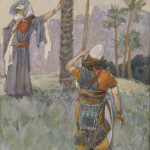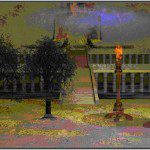This was a family talk (i.e. kids and adults together) that I delivered at the Olivet New Church in Toronto on Sunday, June 6. The actual talk was only in outline form, so this is just a rough write-up of what I remember saying.
David Spares Saul
A Sermon by Rev. Coleman S. Glenn
This morning we’ll be hearing a story about David and King Saul. At this time, Saul was the king over all the land of Israel. You might remember David as a shepherd boy, who killed the giant Goliath. Since that time he had become a mighty warrior. In fact, he was an even mightier warrior than King Saul. The people would say, “Saul has slain his thousands, but David his ten thousands!” That made King Saul angry – so angry that his heart was full of murder for David. An evil spirit would come over him and drive him to try to kill David. Saul would raise armies, and for a very long time he chased David all over the land of Canaan, trying to kill him.
As our story begins, David is hiding in a cave, and Saul comes into the cave – but he does not see David. David has a chance to kill Saul, to kill the man who has been making his life miserable, who wants to kill him. Here’s the story:
Think of the courage that it took for David to not kill Saul. David’s men said to him, “Behold, the day of which Jehovah said unto you, Behold, I will give your enemy into your hand, and you shalt do unto him as it shall be good in your eyes.” His men were encouraging him to kill Saul. This was David’s opportunity to avenge himself! If David would just kill Saul, David – and all his men – could finally stop running.
But David did not listen to his men. He would not kill Saul. He restrained his men from attacking Saul. Why?
David would not kill Saul because Saul was Jehovah’s anointed. That meant that he had been specially chosen by the Lord to be a king. In those times, they would pour oil over someone’s head when they became a priest or a king, as a sign that they represented the Lord in a special way. David knew that even though Saul had tried to kill him, it would be wrong to kill Jehovah’s anointed.
So David spared Saul’s life. Not only that, but he went out after him and pleaded with him to stop listening to the people who claimed that David was his enemy. He called him, “My lord,” and “father.” He does not speak in words of anger or hatred, but of sadness and love.
And Saul acknowledges that David is more righteous than him, because David rewarded him with good, even though he had rewarded David with evil. For this moment, Saul recognized that David was more worthy to be king, to represent the Lord, than he was. Later on that evil spirit would come over him again, and he would again try to kill David, but for now he recognized that in sparing his life, David was acting in line with the Lord’s will, and the Lord’s love.
David showed love for Saul, who had treated David as an enemy. Over a thousand years later, the Lord was in the land of Israel, and he taught his disciples that they should treat all their enemies as David had treated Saul. He said,
“You have heard that it has been said, You shall love your neighbor, and shall hate your enemy. But I say unto you, Love your enemies, bless them who curse you, do good to them who hate you, and pray for those who despitefully use you and persecute you; that you may be sons of your Father who is in the heavens, for He makes His sun to rise on the wicked and the good, and sends rain on the just and the unjust.” (Matthew 5:43-45)
The Lord gave His disciples a new commandment: they should love not only their friends, but their enemies as well; they should do good to those who hated them!
The Lord gives this same commandment to us: we are to love our enemies.
Now, today we don’t usually think of people as our “enemies.” But we do have people in our lives who are mean to us, or hurt us, or do things that annoy us. And the Lord asks us to love them.
This isn’t easy. When David was in the cave, his men were urging him to kill Saul. And when someone does something to hurt us, we have a lot of voices telling us that we should get back at them. There are voices in our mind saying, “He needs to get what’s coming to him!” There might even be literal voices – our friends might tell us that we’d be completely justified in doing something to get back at whoever it is who has wronged us.
Take an example. Say your brother took your favourite toy and was playing with it without your permission – and broke it. There are a lot of voices inside that will be telling you to get back at him. Maybe you want to yell and scream at him. Maybe you want to hit him. Maybe you want to take one of HIS toys and break it. He deserves it!
But none of those is keeping the commandment to love your enemy. That desire to hurt someone because they’ve hurt you comes from hell. The evil spirits love nothing more than taking revenge, retaliating.
Now, this doesn’t mean that we have to let people get away with hurting other people. If someone is hurting you, you SHOULD tell an adult, and there need to be punishments. If there were no laws and no prisons, if bad people could do whatever they wanted, society would fall apart. This isn’t what it means to love your enemy.
But what the Lord is asking is that even if we have to punish someone, we do it from love. You can see this clearly in the case of a good parent punishing their children. If a father’s son is being a bully, that father will punish his son. But it’s not to “get back at him.” It’s because that father cares about him, and he knows that if his son keeps on being a bully, he’ll make his own life miserable, as well as the lives of everyone around him.
The Lord looks at all of us the way that a good parent looks at their children. The difference, though, is that the Lord never actually punishes anyone. He has arranged the world in such a way that evil punishes itself. In this world, good people have to carry out punishments, even though they hate to have to do so. In the other world, though, evil spirits punish each other. When one evil spirit tries to hurt someone in some way, he himself is hurt that way. The Lord and the angels wish there didn’t have to be any punishments, but this is the only way that evil spirits can be kept from hurting each other.
In this world, we do have to have laws and courts that punish bad people. But we still have to love them. And even for adults, this can be very, very hard. There are people in this world who hurt other people. There’s a temptation to listen to those voices that David heard from his men, justifying our hatred. There’s a temptation to love most of our enemies, but make exceptions for some. If someone has hurt someone we love, or is continuing to hurt someone we love, loving them seems just about impossible.
How did David do it? How was he able to show that love and respect for Saul even though Saul was trying to kill him? David refused to stretch out his hand against Saul because Saul was Jehovah’s anointed. He had been chosen by the Lord to fulfill a specific role. Saul represented the Lord in a special way, in a way that most people do not. But still, in some sense, every single person – both good and bad – is the Lord’s anointed. The oil that was used for anointing represents the Lord’s love. And every single person has the Lord’s love within them, at the centre of their soul. Now, with people who do bad things, something in their minds has twisted that love. But it’s still there. They wouldn’t be alive without it. And if we are able to look at other people in this way – as vessels of the Lord’s love, created in His image, for a specific purpose – then we can start to love even our enemies. We can do this even more if we recognize that we ourselves are flawed vessels, that we too have sinned – and that the Lord has forgiven us. We pray, “Forgive us our debts, as we forgive our debtors.” And again, this doesn’t mean letting people get away with hurting people. But it DOES mean wishing that every person will turn to the Lord and experience eternal happiness, rather than eternal misery. It means wishing others well, rather than wishing harm on them.
It might seem impossible. But the Lord has the power to love His enemies – and He gives us this power, too, if we pray for it. When we are able to do this, we are sharing in His love – “for He makes His sun to rise on the wicked and on the good, and sends rain on the just and on the unjust.” We have a choice – listen to those voices that tell us that hatred and revenge are sometimes justified, or listen to the commandment of the Lord, who never takes revenge, who hates no one, who wishes the eternal happiness of every person He has created. With His help, we can love our enemies; we can bless those who curse; we can do good to those who hate us; we can pray for those who spitefully use us and persecute us.
Amen














